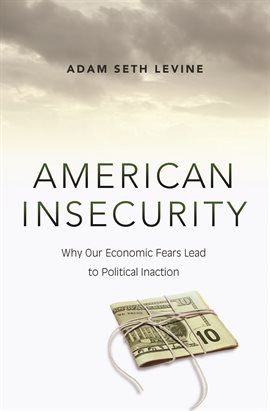
eBook
hoopla Instant
American Insecurity
Year
2015
Language
ENGLISH
Publication Information
Princeton University Press
Summary
"Winner of the 2016 Best Book Award, Experimental Research Section of the American Political Science Association" Adam Seth Levine is an assistant professor in the Department of Government at Cornell University. He has published in a variety of outlets such as the Journal of Politics, Political Analysis, Review of Behavioral Economics, and Political Communication. His work has won numerous awards, including the 2011 E. E. Schattschneider Prize. This prize is the highest dissertation award in the field of American government and is given annually by the American Political Science Association. Why economic insecurity spurs so little collective political action Americans today face no shortage of threats to their financial well-being, such as job and retirement insecurity, health care costs, and spiraling college tuition. While one might expect that these concerns would motivate people to become more politically engaged on the issues, this often doesn't happen, and the resulting inaction carries consequences for political debates and public policy. Moving beyond previously studied barriers to political organization, American Insecurity sheds light on the public's inaction over economic insecurities by showing that the rhetoric surrounding these issues is actually self-undermining. By their nature, the very arguments intended to mobilize individuals-asking them to devote money or time to politics-remind citizens of their economic fears and personal constraints, leading to undermobilization and nonparticipation. Adam Seth Levine explains why the set of people who become politically active on financial insecurity issues is therefore quite narrow. When money is needed, only those who care about the issues but are not personally affected become involved. When time is needed, participation is limited to those not personally affected or those who are personally affected but outside of the labor force with time to spare. The latter explains why it is relatively easy to mobilize retirees on topics that reflect personal financial concerns, such as Social Security and Medicare. In general, however, when political representation requires a large group to make their case, economic insecurity threats are uniquely disadvantaged. Scrutinizing the foundations of political behavior, American Insecurity offers a new perspective on collective participation. "Levine provides evidence that financially anxious people respond to their stress not by grouping together for action but by becoming less generous with their checkbooks and personal time." "This provocative volume identifies the 'self-undermining' political rhetoric inherent in the discussion of important economic issues as the driving reason contemporary working-and middle-class Americans have not produced political movements corresponding to the scale of the financial challenges they face. . . . The research presented here is an interesting, well-defended addition to the literature on the nature of collective political action." "Powerful and highly accessible. . . . Levine has succeeded in shining a light on the disconcerting reality that many citizens abstain from getting involved in addressing the very issues that deeply affect and permeate their everyday lives."---John V. Kane and Jason Barabas, Journal of Politics "The book does a wonderful job of highlighting political interest and (lack of) activity around a set of important social issues, but the contribution to a larger theory of participation is important as well. . . . The book should be appreciated by scholars of political behavior, political psychology, or political rhetoric who should welcome the theory and analysis that Levine provides in demonstrating the self-undermining nature of certain types of political rhetoric."---Hans Hassell, Public Opinion Quarterly "I admire American Insecurity for several reasons. The author is quite transparent about his assumptions and procedures, and his writing is to the point and